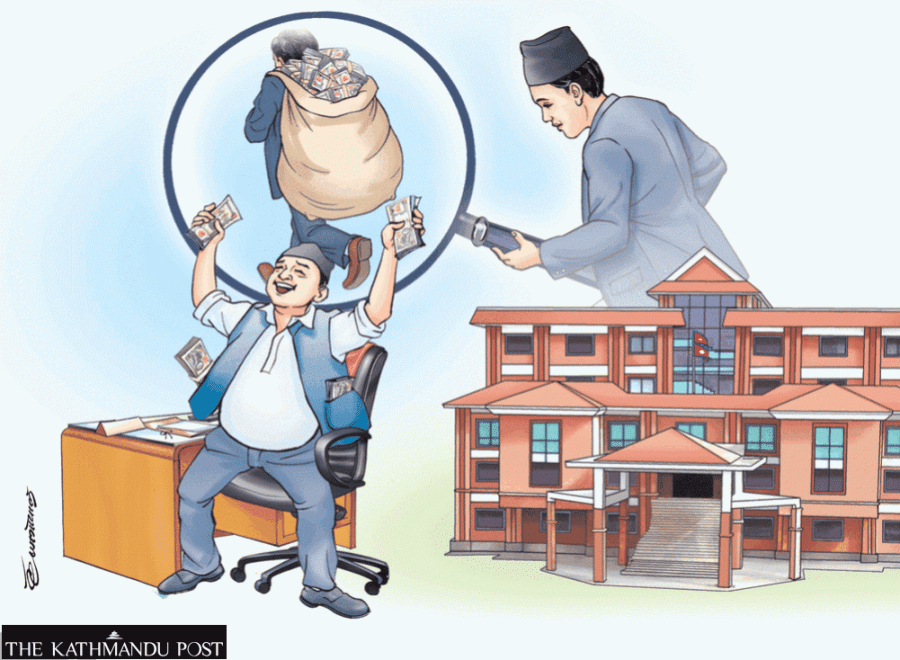Columns
Starting an anti-corruption crusade
Prem Kumar Rai’s recent steps are praiseworthy, provided they come with no strings attached.
Paban Raj Pandey
In recent months, there has been a sudden pickup in filing of corruption cases by the Commission for the Investigation of Abuse of Authority (CIAA), which for years has come under heavy criticism for only going after the small fry and turning a blind eye to the big fish. This time around, two of the charges link big names. One involves Madhav Kumar Nepal, former prime minister, current chairman of the Communist Party of Nepal (Unified Socialist) and one-time general secretary of the Communist Party of Nepal (Unified Marxist-Leninist) which is now led by Prime Minister KP Sharma Oli, and the other Mohan Bahadur Basnet, Nepali Congress lawmaker and former minister.
Nepal, who served as prime minister between May 2009 and February 2011, and four former ministers make up 93 individuals accused of allowing Patanjali Yogpeeth and Ayurveda Company Nepal to purchase large tracts of land exceeding the legal ceiling and sell more than half of the land at higher prices within two months; the CIAA is seeking Rs185.5 million in damages. Likewise, Basnet and several top bureaucrats are among 16 individuals and two companies that the anti-graft constitutional agency has accused of misappropriating Rs3.21 billion in relation to the procurement of telecommunications traffic monitoring and fraud control system (TERAMOCS) for the Nepal Telecommunications Authority.
Of these two cases, Nepal’s case stands out, as this has the potential to set a precedent. Since the 1990 onset of multiparty democracy, bureaucrats and low-tier politicians typically were the ones to be incriminated in corruption cases. In fact, this is only the third time an executive head has been charged with corruption. In 2005, Sher Bahadur Deuba, then prime minister, was convicted of corruption by the Royal Commission on Corruption Control in a case relating to the Melamchi Water Supply Project, but the conviction was deemed unconstitutional by the Supreme Court. In 1978, during the Panchayat era, Tulsi Giri, former prime minister, was charged with irregularities in carpet exports but was acquitted by the court.
Cabinet decisions not above the law
Nepal’s case particularly holds importance because it involves Cabinet decisions. The Patanjali transactions took place in January and March of 2010—the decision to allow it to set up an Ayurvedic medicine factory in January was followed by a decision to permit it to sell a big chunk of the land to a housing company in March. Both were Cabinet decisions and were deemed unprosecutable. The CIAA Act, 1991 says that the commission will not conduct an investigation, inquiry, or take any action on matters pertaining to any policy decision collectively made by the council of ministers or any of its committees. Such policy decisions—essentially deemed above the law—are making a mockery of the system.
Time will tell if the CIAA’s latest initiative is done with good intentions or comes with an ulterior motive. These successive anti-corruption efforts are hitting the headlines after the Financial Action Task Force, a Paris-based anti-money laundering watchdog, put Nepal on its grey list in February. Nepal was also put on the list in 2008 and stayed there until 2014, when laws were amended to combat money laundering and terrorist financing. However, these laws remain limited to paper, as implementation falls short. Corruption is widespread, and there is a lack of good governance. If no necessary reform is carried out within two years, Nepal runs a risk of getting relegated to the dreaded black list.
The CIAA is led by Prem Kumar Rai, who began as commissioner in February 2021 after being appointed by Oli. Rai’s appointment was controversial to say the least. In December 2020 and May 2021, 52 individuals, including Rai, were recommended by the Constitutional Council for appointment to various constitutional bodies. No parliamentary hearings could be held as Oli, then prime minister, dissolved the Parliament shortly after making those appointments. Lawsuits followed. On both occasions, the dissolved Parliament was soon reinstated by the Supreme Court. However, it took four years to decide on the 52 appointments. On July 2, the Court upheld the appointments on a three-to-two vote.
Important precedent set
Rai is now free to complete his six-year term. The fact that he was appointed with the help of an ordinance constantly raised legitimacy questions. The Supreme Court’s verdict last week—albeit narrow—now gives him a golden opportunity to etch his name in the annals of Nepal’s anti-graft history by taking on corruption head-on. Not a single day goes by these days when Nepalis are not treated with some new scandal. Corruption is rife in both bureaucracy and politics, involving bureaucrats and politicians at the top echelons of power. It is against this background that Rai’s recent bold steps are praiseworthy, provided they come with no strings attached. His remaining term in office will be telling.
It is widely argued that Rai is merely acting as a pawn in Oli’s game. The enmity between Nepal and Oli runs deep. In August 2021, Nepal split from the UML to form his current party. Leading up to that, in May 2018, Oli’s UML and Pushpa Kamal Dahal-led Communist Party of Nepal (Maoist Centre) merged to form the Nepal Communist Party; but in March 2021, the Supreme Court declared the merger defunct. By then, rifts were showing up between Dahal and Nepal on one side and Oli on the other, with the latter consistently being accused of being an authoritarian. Simplistically, had Nepal not broken away, his 10 seats in the House of Representatives would have made the UML the largest party with 89 seats.
To silence the people who blame him for having vindictively prodded Rai to go after Nepal, all Oli needs to do is encourage Rai to investigate cases involving his own cadres. Thus far, most of the prominent CIAA cases made public involve either Nepali Congress or Maoist Centre politicians. The UML is not all clean. Even Oli’s name is implicated in scandals. Now that a precedent has been established for Cabinet-level decisions being no longer forbidden, Oli has to remember that his rule will end—be it nationally or within his party. Once out of power, it does not take long before the victor becomes a victim. As a counter, Oli should focus on winning voters’ hearts by joining Rai in a corruption crusade.




 8.67°C Kathmandu
8.67°C Kathmandu















